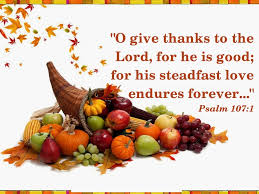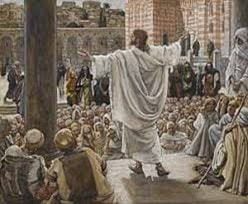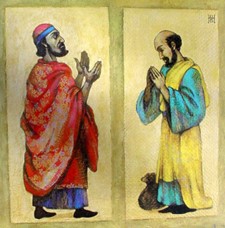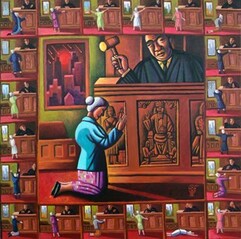
Romans 13:11-14, Matthew 24:36-44
In the hustle and bustle of holiday cheer --finishing off the remains of the turkey and the last morsels of pumpkin pie-- in the blitz of black Friday sales, yesterday’s Small Business Saturday offerings, tomorrow’s Cyber Monday goodies, and-- hopefully there’s enough left over for Giving Tuesday requests that has jammed our mailboxes – as we are pulled to and fro, from store to store and house to house, in the midst of it all -- the first week of Advent arrives today unannounced. All of a sudden, the church linens have changed to purple or blue, and the candle of Hope shines, we take the first step to the celebration of the birth of Jesus Christ on Christmas Day. Friends, where did the time go? Advent has slipped in our schedule unnoticed, unprepared for, demanding our attention. It calls us away from the glitz and glamour that has come to define these final weeks leading to Christmas.
To make matters more confusing, our readings today seem to have nothing to do with the spirit of joviality conveyed through all the decorations and holiday images cramming the airwaves and cyberspace. Today Jesus forewarns his disciples to stay awake and alert, because no one knows the hour and day of the arrival of the Son of Man. In the Greek the arrival of the son of man, the second coming of Jesus, is called parousia, which was translated into the Latin by the early church as “Adventus” from which we get our word of the day, Advent. Yet for us, Advent means those weeks taking us to the birth of Jesus, right?
The real Advent in the New Testament Scriptures points to the second coming of Christ. So, for us, this season of Advent calls us to live in a tension of anticipation of the birth of Jesus with the anticipation of the second coming of Christ; aka Judgment Day. The moment when Jesus comes again, amidst many signs and wonders, to separate the sheep from the goats, the righteous from the unrighteous, and realize the words of the Lord’s prayer that declares “thy kingdom come, thy will be done, on earth as it is in heaven. The second coming of Jesus has become the stepchild of Advent: Who here has ever seen images of Judgement Day portrayed in the scenes from in shop windows or in commercials hawking goodies for us to buy or eat? Who has heard a Christmas carol hailing the second coming of Christ? Yet today’s scriptures are adamant that we are called in this season of Advent to be awake and alert to Jesus’ eventual return.
This waiting for Jesus to return abounds in the New Testament. Jesus declares (Matthew 16:27 )“For the Son of Man is going to come with his angels in the glory of his Father, and then he will repay each person according to what he has done.”
Paul exhorts us in our reading from Romans today that night is over, dawn is about to break. Elsewhere Paul teaches ( 1 Thessalonians 4:16-17): “For the Lord himself will descend from heaven with a cry of command, with the voice of an archangel, and with the sound of the trumpet of God” and (Hebrews 9:28): “So Christ… will appear a second time, not to deal with sin but to save those who are eagerly waiting for him.”
Luke reports at Jesus’ ascension how the angels remind the disciples:
(Acts 1:10-11): “This Jesus, who was taken up from you into heaven, will come in the same way as you saw him go into heaven.” Peter reminds the churches: (2 Peter 3:10): “ the day of the Lord will come like a thief, and then the heavens will pass away with a roar, and the heavenly bodies will be burned up and dissolved, and the earth and the works that are done on it will be exposed.”
Doesn’t sound very Christmasy, does it?!
The first generation of Christians believed Jesus would return in their lifetime. However, when the Parousia, the second coming was delayed, spiritual fervor fell by the wayside, people dismayed of hope, old sinful habits crept back as believers began to doubt the word of God. Jesus forewarns of this in today’s reading: stay awake and alert, because no one knows the time and day of his return. Jesus declares that he doesn’t even know!
Every generation since Jesus’ ascension into heaven has believed they lived in the end times and thus Jesus’ return to earth was imminent. Gallons of ink have been spilled creating endless theories about the delay, interpreting scripture to fit various guesses to pinpoint when it will all take place. The accuracy rate of all these guesses is one big fat zero. As Jesus said it, no one knows the time or the day. The psalmist reminds us (90:4): “A thousand years in your sight, are like a day that has just gone by, or like a watch in the night.” But the one point that is true is that indeed we are living in the end times, we have been living in the end times since Jesus returned to heaven, and we will live in the end times until Jesus returns to earth. And truthfully, that’s all we honestly know.
So, what on earth does all this talk about the end times, the second return of Christ, staying awake and alert have to do with us, here on first Sunday of Advent, 2022, as we reflect on the hope candle?
I am reminded that Hebrew has two words for hope, the first is yachal, which means to wait, hope, expect. It is first used in Gen. 8:12 in the story of Noah. Remember the whole sorry tale on how wicked humankind had become, so God despaired of the whole lot, expect for Noah who was righteous and walked with God? So, God tells Noah to build an Ark, then take two of all creatures on it, and then sends the waters to flood the earth. After the flood had wiped out the earth, and the ark settled on Mt. Ararat, Noah tested to see if it were safe to leave the ark. First, he sends out a raven, which promptly returns. Then he waits sends out a dove, which returns in seven days with an olive branch. Noah waits and sends out the dove again which doesn’t return. The word for waiting here is also hope. Noah hopes, after living through the wickedness of humankind. Noah hopes, as the floods cover the earth. Noah hopes as the waters slowly recede. Noah hopes until finally the dove doesn’t return and the time has come to leave the ark.
Hope implies waiting. Hope implies a profound trust in the word of God to be fulfilled in God’s time. Hope implies belief in an outcome that has yet to come to pass. Hope is the focus point of the word of the prophet Micah, who declares: “But as for me, I will watch expectantly for the LORD; I will wait for the God of my salvation. My God will hear me (Micah 7:7).” Just replace “wait” for hope and we get the message of the Hebrew text. Because of Jesus’ birth, his life on earth, his death on the cross and resurrection, we are confident of his eventual return. That’s hope. Hope implies waiting, but not a passive waiting where we twiddle our thumbs, or we become impatient, lax, and begin to sit around gorging ourselves, and drinking, carousing and getting drunk, indulging our baser instincts, filled with jealousy or dissension.
Hope calls us to Christ-like action: that we walk with God like Noah, that we fill our days with good deeds. Hope says keep our hands busy serving each other and standing up for matters of peace and justice. Hope says use our minds filled with promises of God contained in Scripture. Hope says speak to upbuild one another. Hope says encourage the best. Hope says live to our spiritual finest. Hope says speak the truth with love. Hope says test the waters, send out the dove. Like Noah we live in a sea of wickedness. God has placed us in the ark which is the church. And in these end times, for however long it takes, we wait, we hope, we endure. We act with prophetic courage for the age to come. That’s the hope that Advent calls us to have.
The advent practice of leaning into hope means that we don’t get overwhelmed by the sorrows and evil of the world, but we actively pursue overcoming evil with good. Leaning into hope means we don’t get distracted by the superficial gaiety of the season which commercializes and distorts the unconditional love, witness and bravery of the Christmas story. Hope claims for us Mary’s yes, Hope claims for us Joseph’s faith, Hope claims for us the shepherds’ devotion, Hope claims for us John’s brave witness to the truth. Hope claims for us the generosity and wisdom of the magi. Hope claims for us the brilliance of the Bethlehem star. Hope was born on Christmas day and hope will return to us and bring us a new heaven and new earth. And in this in-between time, these last days, we get busy and we hope.
So, as we juggle messages of pain of another mass shooting, another hate crime, one more earthquake, another nation’s cruelty, the incessant cries of the poor and oppressed -- with that pounding, compelling messages to buy, buy, buy; gorge, bake, decorate, drink to oblivion – let us stop! Let us breathe. Let us fix our eyes on this candle of hope. Let us lean into the brilliance of its flame, and there find the strength to wait. Let hope awake us, and prod us to be alert. Let us find the hope of a better world that compels us to act with love now, to clothe ourselves in Christ now, and to walk righteously with God now, with the confident assurance in the promise that Jesus is with us, now to the end of the age. Amen.
https://www.youtube.com/watch?v=VcSu69jIfhA






 RSS Feed
RSS Feed